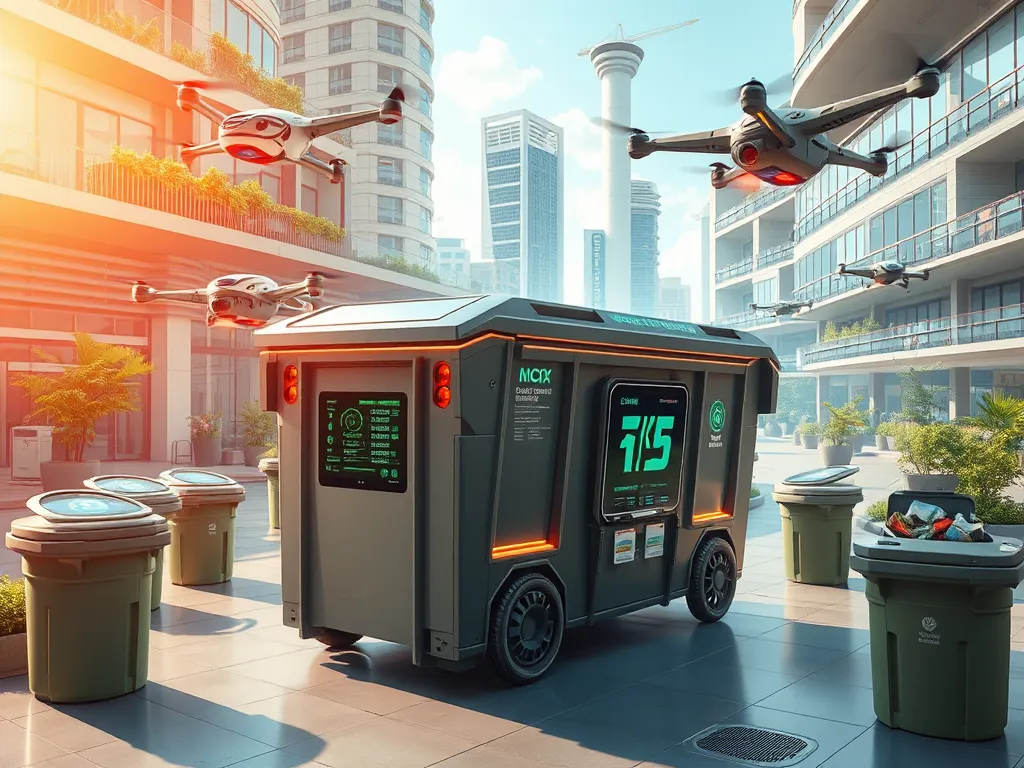Revolutionary Innovations in Dumpster Rental and Waste Removal Technology

Innovations in Dumpster Rental and Waste Removal Technology
In recent years, the waste management sector has seen significant advancements, specifically in dumpster rental and waste removal technology. Innovations in dumpster rental and waste removal technology are reshaping how businesses and municipalities manage waste, making processes more efficient and environmentally friendly. This includes the integration of smart tech, automation, and data analytics, which collectively aim to enhance waste management practices.
One of the most notable innovations in dumpster rental and waste removal technology is the advent of smart dumpster solutions. These IoT-enabled dumpsters allow for real-time monitoring of waste levels, ensuring that waste collection occurs just in time rather than on a fixed schedule. This not only conserves fuel and reduces costs for waste haulers, but also minimizes the environmental impact of unnecessary trips to empty half-full containers.
Furthermore, mobile applications are emerging as key players in the dumpster rental space. With the rise of user-friendly mobile apps, customers can now easily rent dumpsters, manage their waste removal schedules, and even track the status of their pickups from the comfort of their smartphones. This innovation in access and convenience is particularly valuable for construction sites and homeowners alike.
Another significant focus area for innovations in dumpster rental and waste removal technology is eco-friendly waste management solutions. The industry is increasingly embracing biodegradable dumpster liners, which help reduce plastic waste in landfills. Furthermore, the integration of electric and hybrid vehicles for waste collection is on the rise, facilitating a greener approach to transporting waste materials.
With its innovative approach, RTS is transforming the landscape of service delivery in the community.
Additionally, advances in recycling technology are helping to streamline waste removal processes. Innovations allow waste management companies to better sort recyclables, enhancing recycling rates, and reducing contamination in the waste stream. Collectively, these efforts bolster the ecological sustainability of waste management practices.
Smart Dumpster Solutions
IoT-enabled dumpsters have transformed the traditional waste management model. By using sensors to monitor fill levels, these smart dumpsters allow waste management companies to optimize their collection routes and schedules based on real-time data, rather than estimates. This shift not only enhances efficiency but also contributes to lower operational costs.
Real-time tracking can also extend to waste collection vehicles. By using GPS technology, waste haulers can enhance their operational efficiency, ensuring that disposal routes are optimized and that vehicles are deployed as needed. This data-driven approach reduces fuel consumption and vehicle emissions, contributing to a cleaner environment.
Alongside these advanced monitoring systems, mobile applications have simplified the dumpster rental experience. Users can easily browse available dumpster sizes, book rentals, schedule pickups, and even make payments via their mobile devices. This integration of technology enhances customer satisfaction and facilitates quicker, more efficient waste management services.
Eco-Friendly Waste Management
The introduction of biodegradable dumpster liners is a groundbreaking innovation in waste management. These liners decompose over time, reducing the amount of plastic waste entering landfills. They are a practical solution for both residential and commercial waste, promoting a more sustainable approach to waste disposal.
Electric and hybrid waste collection vehicles are gaining traction within the industry as well. Transitioning from traditional gas-powered trucks to cleaner alternatives is a crucial step toward reducing the environmental footprint of waste collection operations. These vehicles not only lower greenhouse gas emissions but also provide a quieter alternative for waste collection, benefiting densely populated areas.
Moreover, advancements in recycling technology are paving the way for more efficient waste removal and material recovery. Automated sorting systems utilize AI to separate recyclables from non-recyclables, increasing the overall efficiency of recycling operations and ensuring that valuable materials are recovered and repurposed.
Automation in Waste Removal
Robotic waste collection systems are on the horizon, promising to change the face of waste management. These systems can automate the process of collecting waste, reducing labor costs and minimizing human exposure to potentially hazardous materials. This innovation could prove especially beneficial in high-risk environments such as construction sites.
Additionally, automated sorting technologies help to streamline the recycling process, improving the accuracy and speed at which materials are sorted. This minimization of contamination in the recycling process results in higher-quality recyclable materials that can then be reused or repurposed effectively.
Artificial Intelligence (AI) plays a pivotal role in optimizing waste disposal routes. By analyzing data on waste generation patterns, AI algorithms can suggest the most efficient collection routes, reducing fuel consumption and travel time for waste collection vehicles. This technological integration promises greater efficiency and lower operating costs for waste management companies.
Data-Driven Waste Management
Utilizing big data to analyze waste patterns has become a game changer for the waste management industry. By understanding trends in waste generation, companies can adapt their services to meet customer demand more precisely, enhancing service delivery and reducing waste-related incidents.
Predictive analytics allows companies to forecast dumpster demand based on historical data and patterns. This information facilitates better inventory management, ensuring that enough dumpsters are available during peak seasons, preventing overreliance on manual processes, and minimizing service delays for customers.
Digital platforms for waste management performance tracking are essential for transparency and efficiency. Long gone are the days of manual reporting; now, real-time tracking provides insights into collection efficiency, costs, and environmental impact assessments, allowing for better decision-making across the industry.
Community Engagement in Waste Practices
User-friendly platforms for reporting illegal dumping have started to emerge, enhancing community involvement in keeping neighborhoods clean. These platforms allow residents to easily report issues, which helps authorities respond more swiftly and maintain cleaner public spaces.
Incentive programs for recycling participation are another innovative approach to engage communities. By offering rewards for recycling efforts, municipalities can prompt residents to be more proactive about waste management and foster a stronger culture of sustainability.
Lastly, educational campaigns on waste reduction and sustainability serve to empower communities, teaching residents about the importance of proper waste management practices. These initiatives create a more informed population that is likely to engage actively in recycling and composting efforts, fostering a collective responsibility towards waste reduction.
